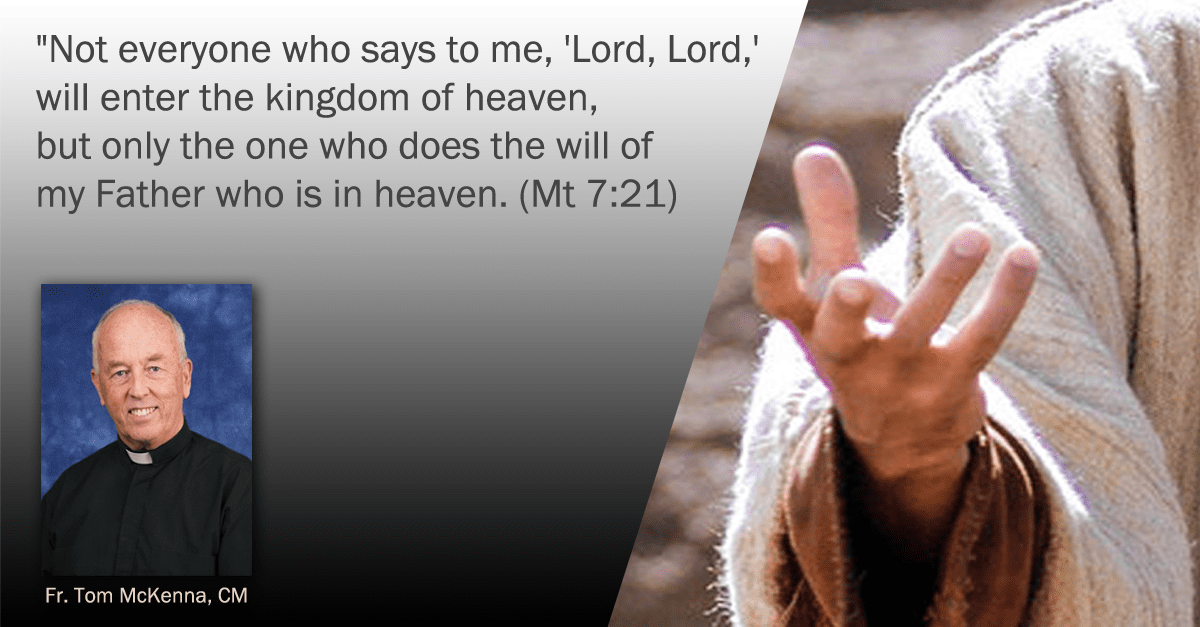Nike vs. Volvo and the Vincentian Spirit – T. McKenna
 What can we learn about the Vincentian spirit from Mike and Volvo? Father Tom McKenna offers some insights…
What can we learn about the Vincentian spirit from Mike and Volvo? Father Tom McKenna offers some insights…
“Just Do It.” ( Mt 7: 21-29.)
I once read an author who pointed out two basic approaches the advertising industry uses to sell a product. The first he called the “Volvo” approach and the second the “Nike” strategy – Volvo being the automobile manufacturer, and Nike the running shoe company.
The Volvo approach appeals to reasons; i.e., why the car is a superior one: its engineering excellence, advanced safety features, aerodynamic shape. The Nike features action; i.e., “just do it; just try on a pair of these sneakers and go running in them. When you actually take off in them, you’ll know how good they are.”
The logic of the first is: if I give solid enough reasons for buying this auto, the customer will more likely go out and buy it. The outlook of the second is: using the product (“doing it”) is going to teach you its worth.
It’s Here-are-the-why’s, so-do-it, versus Do-it, that-will-reveal-the-why’s.
Part of the thought behind approach number two is that acting has a way of teaching (and reinforcing) the underlying reasons for taking the action. In more psychological terms, it’s often more effective to act my way into new insights and behaviors than it is to think my way into them.
In this Gospel incident (Mt. 7: 21 ff), Jesus leans toward the second approach. While not dismissing hearing and saying, he gives primacy to doing.
“If you only say and don’t do, you won’t enter the Kingdom of Heaven. If you only hear and don’t do, the same fate awaits you.”
Action for the Kingdom trumps mere words about the Kingdom. Doing things to put flesh on that Word is more to Jesus’ liking than simply hearing the Word. At least in this passage, “just do it” takes precedence over “here’s the reason why you should do it.”
To be clear, Jesus isn’t telling the disciples (us) not to hear and not to speak. He isn’t saying “do it without listening,” or “act on the Word without also proclaiming and explaining it.” But here he’s putting the primacy on action. He insists that the disciples turn their words and prayers into deeds.
Two reflections on this: one to do with the Jesuits and the other a related one connected with us Vincentians.
In an article on the origins of the Jesuit spirit, one writer observed how crucial a role the early educational works of the Society played in shaping its charism. In the beginning, Ignatius didn’t seem to favor one kind of apostolate over another, but soon enough many of his men were involved in schools. This kind of service not only fit the needs of the post-Reformation Church, but it also provided an especially pliable medium for expressing some of Ignatius’ key intuitions.
The author pointed out how in turn the ministry itself shaped the spirit of its ministers. It would be only a part of the story to say that the Jesuit spirit (customs, formation programs, heroes, vocabulary) arose purely and simply from Ignatius’ meditations in the Spiritual Exercises. The education apostolate had a reciprocal effect on the Jesuit ethos. It flowed back into the Exercises, as it were, giving them a certain tone and interpretation.
In other words, the work the men did affected who the men became. And isn’t this the case with every religious charism — never pure spirit and never all action, but some interpenetration of the two.
How might this speak to the Vincentian spirit?
In the first place, there can’t be much doubt about on which side of the Volvo/Nike divide Vincent himself lands. Not just in his writings and signature mode of operating but also in his reputation in the Church universal is Vincent associated with the action side of things. He repeatedly shows impatience with sentiments that don’t take on flesh in some concrete form or other. A recent video makes the claim that the Vincentian question is, “What is to be done?” The very first words of his Common Rules speak of Jesus coming first to do and then to teach.
But secondly, there’s that insight about how work shapes spirit. If the educational ministry of the Jesuits came so strongly to color their spirituality, how much more powerfully work for the world’s poor has molded our spirit? How many times since Vatican II have we heard statements that the touchstone for our Vincentian character is closer contact with the world of the marginalized, feeling their experience and seeing things through their eyes?
And so take our educational works, for instance the universities. Though this might be stating things too strongly, there’s a sense in which in recent years they have had to justify themselves as Vincentian by showing how in fact they positively interact with the poor. To stay Vincentian, if I could put it that way, they have had to re-align goals along these lines, not only aiming to help poorer people directly but equally to sensitize their students and staff to the need to work for justice.
Take our parishes. Note the increased amount of messages coming from our leadership and form the wider Family encouraging them to center themselves more closely around the concerns of the poor. There are now funding bodies in the family, like the Franz Foundation and the VSO, whose criteria for distributing their grants to our parishes puts great stress on elements that would heighten evangelization of people who are poor.
These and other measures are all ways of increasing the pressure, so to speak, on us to stay in contact with this foundational work of bringing the good news to the poor. The distinctive flavor of such ministries over the centuries has “circled back” to shape and refine the spirit which came from Vincent’s own hand.
We go back to Jesus and his “doing” counsel to the disciples in Matthew. He’s underlining the indispensability of carrying through in action. While not advising them to be mindless activists, he nonetheless is stepping hard on the pedal of fruitful action, showing little patience with words and spiritual currents that don’t anchor themselves in fleshy and concrete help for the neighbor – and indeed especially the very least of the neighbors.







0 Comments